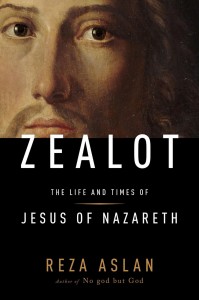“Being Muslim was like being from Mars … Jesus, on the other hand, was America,” writes Dr. Reza Aslan in his #1 New York Times best seller Zealot: The Life and Times of Jesus of Nazareth. Aslan (Harvard Divinity School MTS ’99), the subject of recent controversy surrounding his biography of Jesus, has been criticized by Fox News, Christian political groups, and even by The Washington Post for the “biases” that arise out of his personal religious beliefs.
Aslan was most notably deprecated by Fox News’ Lauren Green in an interview that went viral within days. Green opens her interview with Aslan by asking, “You’re a Muslim, so why did you write a book about the founder of Christianity?” Green’s torrent of inquiries, all aimed at Aslan’s personal beliefs, tow the line between criticism and bigotry. Ought we to seriously believe that Muslims cannot write about Christianity? Isn’t a Masters in Theological Studies from the Harvard Divinity School enough to outweigh private beliefs?
Political biases aside, Fox News’ interest in Aslan’s personal beliefs raises important questions about academic discourse in 21st century America. How do we read works of historical inquiry written by “outsiders?” What is the role of subjectivity in academia? What is Jesus’ place in the American political arena?
Jesus as Zealot
Why does Zealot spur so much controversy? Aslan’s biography argues that the “historical Jesus” was a zealot. It paints a picture of a viciously insurgent prophet, a religio-political revolutionary, and a theological figure working to certain political ends, notably the creation of a theocratic state in Roman Judea. Aslan’s arguments within the text create a Jesus foreign to most Americans. He postulates that Jesus was a social revolutionary, a challenger to conventional authority. In Aslan’s interview with the HPR, he explains, “When you’re talking about Jesus, you’re talking about a Middle Eastern socialist who advocates for welfare and free health care.” Aslan’s Jesus, frankly, does not conform to traditional conservative American values. Aslan’s argument, however, does not seem to be the point of contention. His sources are sound. His analysis is defensible, even unoriginal. Since the beginning of the search for the “historical Jesus” in 18th century Germany, academics have proposed the idea of a “politically engaged Jesus,” according to Dr. Giovanni Bazzana, associate professor of the New Testament at the Harvard Divinity School.
The search for the historical Jesus has always been plagued by political undertones. Bazzana explains that under the Nazi Regime, German academics tried to prove that Jesus was not a Jew. According to Aslan, “Ideas about the historical Jesus were deeply engaged, deeply connected to politics, culture, and society.” He adds that because of this, “[Jesus] is an infinitely malleable character. He is whatever a community sees in him, and he takes on the cultural, national, and ethnic identity of his worshippers.”
Even though Aslan’s arguments are neither particularly novel nor unfounded in historical research, his religious practices, cultural heritage, and racial background jeopardize his legitimacy as a writer in the eyes of people like Lauren Green. An emigrant from “the axis of evil,” Aslan’s background as an Iranian Muslim poses the greatest threat to his scholastic authority.
On Reflexivity
In the words of Bazzana, “No one draws any objective data in historical research.” When asked if his book is objective, Aslan himself says, “No history can be objective.” Even academics are people—people who have cultural influences, beliefs, and unique identities. Perhaps it is fair then, to keep in mind Aslan’s perspective and cultural influences. He is, of course, Muslim. He is also an Iranian-American man from California, a Harvard-educated scholar, and a former Christian. Aslan, like most Americans, belongs to a laundry list of cultural identities that cannot all be accounted for.
Yet, according to Dr. Steve Caton, professor of Contemporary Arab Studies at Harvard University in an interview with the HPR, “The idea that one can speak from a pure cultural identity is a fantasy.” Caton writes extensively on the concept of reflexivity in the context of his work as an anthropologist. In regards to bias in academia, Caton poses a critical question: “Being aware of where one is coming from, can one then be critical of what one says, and can one somehow be creative in trying to say something different?” This is the crux of reflexivity.
Aslan concedes his possible biases in the prologue of his text, an admission of positionality—even reflexivity—that reflects a genuine will to study Jesus from a neutral standpoint. Still, this concession poses a difficult problem in the academic world. Why does Aslan feel the need to justify himself as an authority on Jesus, when hundreds of Christian scholars before him felt no such need? How can American culture move away from skepticism towards the “outsider,” when his perspective is as plagued by subjectivity as any “insider’s”?
The Outsider Effect
The historical Jesus has been studied from the Christian perspective almost exclusively. And to whose benefit? Certainly an “outsider” can provide no less subjectivity than a religious follower of Jesus. “The outsider’s perspective can be very valuable, very interesting,” Caton remarks. A diversity of perspectives, in Caton’s view, creates a fuller picture than the “insider” perspective alone.
Ingrid Monson, Quincy Jones Professor of African American music at Harvard University, adds to Caton’s argument, telling the HPR, “It’s really great when ‘outsiders’ study culture … Often an ‘outsider’ will bring a different perspective on things; they might even say things that make people mad, but I think it needs to be part of the dialogue.” Like Aslan, Monson resides in an academic realm as a sort of “outsider.” As a white person studying black culture, Monson has come to the conclusion that “Positionality does matter.”
Defenders of Aslan contend that his personal beliefs are merely tangential to the academic matter at hand. Monson takes a more nuanced perspective, arguing, “It’s much more comfortable to say ‘Everyone is entitled to exactly say whatever they think.’” In other words, it does matter that Aslan is a Muslim man. It does matter that Monson is a white woman. These identities are by no means concrete, but they indicate the possibility of biases that—to a certain degree—threaten the neutrality of academic arguments.
It is similarly comfortable to say that “outsiders” present subjective perspectives that must be questioned. They do of course, but so do the perspectives of “insiders.” When it comes to the study of Jesus, the distinction between “insider” and “outsider” is further complicated as Islam lays claim to Jesus as a key prophet in the Qur’an. Could Islamic Studies grow to include Jesus in the same way Jewish Studies have reclaimed Jesus as a central figure in the Jewish narrative? What significance do the terms “insider” and “outsider” hold if they may evolve in the progression of human society? And what of Aslan’s claims? Is Jesus the key political player, the zealot that Aslan projects?
Vote for Jesus
When asked again, years later after cultivating a career in sociology, Aslan gave the same answer he once gave as a young immigrant in America. Is Jesus America? “Yes! Christianity has become a part of our national narrative. Indeed, I would go so far as to say the cross and the flag have bled into a single national icon. [Christianity] is a part of our culture, our consciousness, our history, our very sense of identity.”
And back to Aslan’s original intent—the examination of Jesus as a political player. What role does Jesus play in American politics? It’s hard to say; Jesus is the founder of the religion that dominates the current political sphere, the key figure in Western sociopolitical thought, and the inspiration for the most influential piece of literature in world history, the Bible—which raises an equally important question. Who is Jesus as a strictly political player? Aslan says, “A man whose entire ministry is predicated on the reversal of the social order, that the first shall be last and the last shall be first, that the hungry will be fed and the fed will go hungry—which of course is quite a threatening idea in any society—a man who confronted the political and religious powers of his time simply because they had put themselves in positions of power.”
If we are to read Jesus as a politician, does he deserve our vote? Aslan thinks so. “Jesus of Nazareth … is every bit as compelling, charismatic, and praiseworthy as Jesus the Christ. He is, in short, someone worth believing in.”

